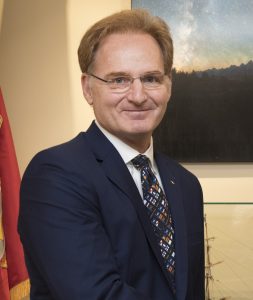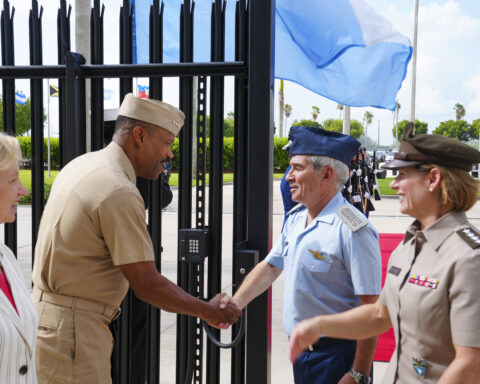
A clean sheet review of how the Navy educates sailors and Marines is now underway, with results expected to alter the way Department of the Navy training is conducted.
The wide-ranging study is to explore how the Navy can upgrade its education methods in order to maintain a competitive edge at a time when adversaries are increasing their technical know-how, according to a memo released Monday by Thomas Modly, undersecretary of the Navy.
“Continuous learning — and sharing hard-won knowledge – represents a combat-proven key to victory for our naval services,” Modly writes in his memo announcing the formation of his Education for Seapower study. “Our flagship educational institutions, including the United States Naval Academy, Naval Postgraduate School, Marine Corps University, and Naval War College, along with the many outstanding national colleges and universities associated with the Reserve Officers Training Corps, have long and well served the nation in educating our future leaders. They inculcate not only the finest sense of honor and integrity, but also creativity and deep rigor in thinking about the future of naval warfare, especially in times of great change.”

Evaluating the way sailors and Marines are educated has been a priority for Modly since he was sworn into office in December. When delivering speeches or prepared remarks, Modly frequently mentions his alma mater, the U.S. Naval Academy, motto — Ex Scientia Tridens, which roughly translates to mean through knowledge, sea power.
“As we think about education and its role in the future of our Navy and Marine Corps no words seem more relevant than these. While we surely must invest in more ships, and aircraft, and submarines, and armored vehicles, and new missile systems, nothing will be more important than the investment that we make in knowledge—and on creating a force made up of people who thirst for it,” Modly said two weeks ago while addressing the annual Navy League Sea Air Space exposition.
Conducting the study for Modly is a high-profile team including several form military leaders and thought provokers, including:
- Gen. John Allen, USMC (Ret.), who is currently president of the Brookings Institute, and is the former commander of the NATO International Security Assistance Force (ISAF) and U.S. Forces in Afghanistan
- Amb. Barbara Barrett, currently an Aerospace Corp. board of trustees member, and is the former US Ambassador to Finland. Barrett has served on a variety of science and technology boards and is an instrument-rated pilot. In 2009, she trained at the Gagarin Cosmonaut Training Center in Star City, Russia, and in Kazakhstan, culminating in certification for space travel.
- Adm. Mike Mullen, USN (Ret.), is the former chairman of the Joint Chiefs of Staff, and the former Chief of Naval Operations.
- Vice Adm. Ann Rondeau, USN (Ret.), the former president of the National Defense University (NDU).
- Dr. Harlan Ullman, a senior adviser at the Atlantic Council, and author. His most recent book Anatomy of Failure; Why America Loses Every War It Starts was released in November by the US Naval Institute Press.
The team is expected to spend the next several months meeting with both military and civilian educators, private industry experts, and active duty personnel to determine education methods that work and areas to improve. Their study is due to Modly in December, and he plans to present a final report to Secretary of the Navy Richard V. Spencer in January.
In his memo establishing the study, Modly is clear about wanting input to come from all aspects of Navy and Marine Corps education. The process is to be transparent, with Modly saying he wants to consider every viewpoint.
“Good ideas have no rank,” Modly states in his memo.





